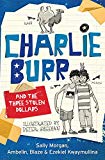
Title
Charlie Burr and the Three Stolen Dollars
Author
Sally Morgan
Secondary Authors
Ambelin Kwaymullina, Blaze Kwaymullina, Ezekiel Kwaymullina
Illustrators
Peter Sheehan
Publisher, Date
Little Hare Books, 2011
Audience
Primary, Upper Primary
ISBN
9781921714047
Language
English
Add to Favourites
-
Subjects
- Camels
- Dingoes
- Humour
- Money
- Western Australia
-
Annotation
Charlie Burr lives in a small town in Western Australia with Dad, Mum and two older sisters, Tia and Sharni. Together with his best mate Johnno, he is constantly on the lookout for opportunities to make money and perplexed when things go wrong. Gross-out humour is a feature of the books – there’s plenty of poo and spew. Unique features of life in a regional community are incorporated – when people are ill or injured, they go to a Nursing Post, and visitors to the town are ‘blow-ins from Perth’.
The dedication reads: For all the fantastic, funny, creative, brilliant, talented kids in regional Australia.
In this book: At the start of Camel Carnival Week, Charlie is presented with a dingo pup found during a prospecting trip by his father. Spike is cute but is immediately in trouble with everyone else at home and school with his messes and mischief so it makes it hard for Charlie to confess that he’s taken some money from his mum as well. His best mate Johnno is preoccupied with his camel Rosie’s participation in the Carnival but help for all Charlie’s problems comes from an unlikely source at that event.
Peter Sheehan’s covers picture Charlie wearing a singlet with an Aboriginal flag design. Internal illustrations as chapter headings evoke a school exercise book, and the design of animal paw prints to break up the text within chapters will help to scaffold readers. The seven chapters of each book are named for the days of the week, setting the pace of the novel and assuring the newly confident reader of a satisfying ending.
Helen Joanne Adam Lecturer in Literacy Education and Children’s Literature has defined five categories of cultural representation in books for children. Although her research focus is primarily picture books, her definition of ‘culturally authentic’ applies to this series: ‘a main character from a minority background and are usually written by an author from the background represented.’ Badimaya Yamatji/African American academic Kirsten Hausia talks about the value of books like this as featuring everyday characters.
About the authors: Sally Morgan and Ambelin, Blaze and Ezekiel Kwaymullina are a family of writers who create as a group and individually. They belong to the Palyku people, from the Pilbara Region of Western Australia. They love writing, reading books, listening to stories and music, walking their dogs, painting and drawing, and having a good laugh. (Especially at each other!)
Illustrator Peter Sheehan does not identify as an Aboriginal person.
Series: Charlie Burr no 1
-
Teaching Resources
- Wikipedia entry on Sally Morgan and her importance in Australian literature https://en.wikipedia.org/wiki/Sally_Morgan_(artist)
- Ambelin Kwaymullina website: Writer and Illustrator http://www.ambelin-kwaymullina.com.au/#!/
- LinkedIn, Dr Blaze Kwaymullina: Business Owner, Academic, Author https://au.linkedin.com/in/dr-blaze-kwaymullina-0a73048b
- Ezekiel Kwaymullina, author profile https://www.walkerbooks.com.au/Authors_and_Illustrators/Ezekiel-Kwaymullina
- Peter Sheehan: Storyboard, Illustration, Design & Writing https://www.petersheehan.com/
- Ken Williams, ‘Reading with a chance of tacos: how important is humour in children’s literature?’, 24 March 2019 http://readingwithachanceoftacos.com/how-important-is-humour-in-childrens-literature/
- Helen Joanne Adam. ‘Bias starts early – most books in childcare centres have white, middle-class heroes’, The Conversation, 11 Feb 2020 https://theconversation.com/bias-starts-early-most-books-in-childcare-centres-have-white-middle-class-heroes-130208
- ‘MTalks - From Margin to Mainstream: New Narratives in Children’s Literature.’ Badimaya Yamatji/African American academic Kirsten Hausia (Culture Crate), Denise Chapman (Monash University), Emele Ugavule (Talanoa) and Torika Bolatagici (Community Reading Room) feature in a panel discussing the importance of access to diverse children’s literature; First Nations, bilingual and oral storytelling; matters of representation; and the power of books to challenge dominant discourse.’ https://mpavilion.org/program/from-margin-to-mainstream-new-narratives-in-childrens-literature/
